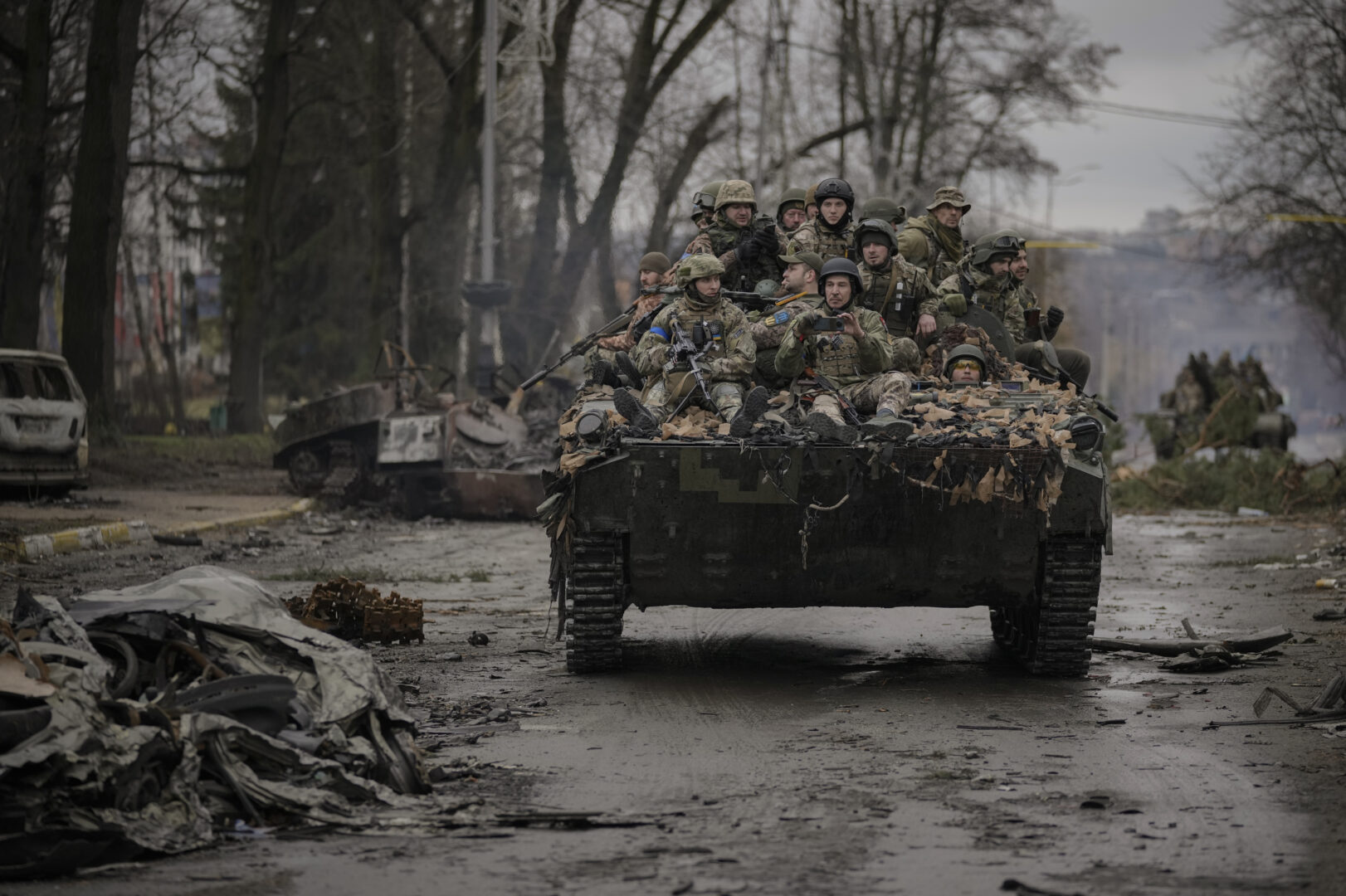www.aljazeerah.info
Opinion Editorials, August 2023
Archives
Mission & Name
Conflict Terminology
Editorials
Gaza Holocaust
Gulf War
Isdood
Islam
News
News Photos
Opinion Editorials
US Foreign Policy (Dr. El-Najjar's Articles)
www.aljazeerah.info
Though War Is a Futile Response to Challenges, Wars Still Continue Unending By Osmund Agvo Premium Times, August 19, 2023 |
 |
 |
|
| Russian soldiers on a tank, in Ukraine, 2023 |
The Unending Cascade of Wars
The aftermath of the First World War served as a foundational crucible for the emergence of the Second World War.
War stands as a perpetually futile response to challenges.
The culmination of one conflict frequently unfurls as the prologue to the next one. Upon the US intervention in Iraq, extinguishing Saddam Hussein and unsettling not merely Iraq, but vast expanses in the Middle East, a subsequent expedition ensued to counter a new group of barbarians recognised as the Islamic State (ISIS) — unveiling the cyclic nature of armed struggles. This tempestuous cascade reverberated globally…
It’s often said that major conflicts result from minor catalysts, but rarely solely due to those catalysts. While the assassination of Archduke Franz Ferdinand of Austria held significance, it is challenging to assert that his murder in Sarajevo on 28 June, 1914, was the sole pivotal factor that led to the demise of an estimated 15 to 20 million individuals during World War I. But what really motivated Gavrilo Princip, a Serbian nationalist, to assassinate the heir to the Austro-Hungarian throne and his charming wife, Sophie? A brief historical overview will provide some clarity.
The Austro-Hungarian Empire, also referred to as the Habsburg Monarchy, was a significant European power that existed from 1867 to 1918. It functioned as a dual-state monarchy, uniting the Kingdom of Hungary and the Austrian Empire under a single monarch, Emperor Franz Joseph I. Included in the mix also, were the Balkans, a region in Southeastern Europe recognised for its diverse cultural, historical, and political traits, encompassing the Czechs, Slovaks, Poles, Romanians, Croats, Serbs, and others.
The Balkans, the region where Sarajevo is situated, was a hotspot of nationalism and ethnic tensions. Numerous ethnic groups within the Balkans aimed at gaining independence from the Austro-Hungarian and Ottoman Empires. Serbia, in particular, sought to unite all Serbs into a singular state, encompassing territories under the Austro-Hungarian control.
The assassin, Gavrilo Princip, and his co-conspirators were part of a clandestine nationalist organisation known as the Black Hand. They perceived Austria-Hungary as an oppressive colonial force that exercised control over and stifled the ambitions of the South Slavic people in the Balkans.
The assassination was orchestrated to align with the Archduke’s visit to Sarajevo, coinciding with the anniversary of the 1389 Battle of Kosovo. This battle held great importance in Serbian history and culture. The Black Hand perceived the archduke’s visit as a chance to convey a message to Austria-Hungary.
After the assassination of Archduke Franz, the Austro-Hungarian government presented Serbia with an ultimatum. This comprised ten demands aimed at addressing the perceived Serbian involvement in the assassination and curbing the activities of Serbian nationalist groups. These demands were deliberately crafted to be stringent and challenging for Serbia to fully accept, with the aim of providing Austria-Hungary a pretext for military action against Serbia.
As Serbia’s response to the ultimatum was deemed insufficient, the Austro-Hungarian government severed diplomatic relations with and immediately after declared war on Serbia. Russia, closely linked with Serbia, initiated partial mobilisation in reaction to Austria-Hungary’s actions. Germany, which had a military alliance with Austria-Hungary, issued an ultimatum to Russia, demanding a halt to its mobilisation.
The signing of the Molotov-Ribbentrop Pact between Nazi Germany and the Soviet Union in 1939 shocked the international community. The pact’s secret protocol divided Eastern Europe into spheres of influence, setting the stage for the joint invasion of Poland. Germany’s invasion of Poland in September 1939 served as the direct catalyst for the outbreak of World War II. The overall death toll, encompassing both military and civilian casualties, is estimated to be around 15 and 20 million people.
When Russia failed to comply, Germany declared war on Russia. Germany also declared war on Russia’s ally, France, and invaded Belgium, prompting Britain, obligated to defend Belgian neutrality, to declare war on Germany. This series of events set in motion a full-blown world war.
The United States initially remained neutral during the early years of World War I. However, various factors eventually prompted it to join the war on the side of the Allies. One of the most impactful factors was Germany’s implementation of unrestricted submarine warfare. German U-boats (submarines) began sinking both military and civilian ships, including American vessels, in the waters around Europe. The sinking of the British ocean liner, RMS Lusitania, in May 1915, which resulted in the deaths of 1,198 people, including 128 Americans, incited outrage in the United States.
In addition, in January 1917, British intelligence intercepted a secret telegram from German Foreign Minister Arthur Zimmermann to the German ambassador in Mexico. The telegram proposed a military alliance between Germany and Mexico, if the United States entered the war against Germany. In return, Germany pledged to support Mexico in reclaiming territories lost to the United States, such as Texas, New Mexico, and Arizona. The revelation of the Zimmermann Telegram further amplified anti-German sentiments in the United States. On 6 April, 1917, the Congress declared war on Germany, thereby officially joining the United States in World War I.
World War I lasted from 1914 to 1918 and ended with the signing of the Armistice of Compiègne on 11 November, 1918. The Allies (primarily France, the United Kingdom, and the United States) emerged victorious over the Central Powers (Austria-Hungary, Ottoman Empire, and Bulgaria). The armistice set the stage for peace negotiations, culminating in the signing of the Treaty of Versailles on 28 June, 1919. The treaty imposed severe conditions on Germany, including territorial losses, disarmament, and payment of reparations. It also instigated significant political and territorial changes in Europe and other regions across the world.
The Treaty of Versailles sowed the seeds of anger and financial chaos in Germany, burdening the country with heavy reparations and land losses. The 1930s economic downturn made things even worse, causing widespread joblessness, poverty, and turmoil. These conditions ultimately paved the way for the rise of totalitarian and expansionist regimes across Europe.
Adolf Hitler’s Nazi Germany and Benito Mussolini’s fascist Italy pursued aggressive territorial ambitions and adopted militaristic policies. The policy of appeasement by the League of Nations and Western democracies towards Nazi Germany’s expansionist actions in the 1930s proved ineffective in deterring its aggression. Germany’s expansionist aspirations aimed at reclaiming its lost territories and establishing a Greater German Empire.
The signing of the Molotov-Ribbentrop Pact between Nazi Germany and the Soviet Union in 1939 shocked the international community. The pact’s secret protocol divided Eastern Europe into spheres of influence, setting the stage for the joint invasion of Poland. Germany’s invasion of Poland in September 1939 served as the direct catalyst for the outbreak of World War II. The overall death toll, encompassing both military and civilian casualties, is estimated to be around 15 and 20 million people.
In the chaos of war, the contours of victory blur, revealing an irrevocable calculus where losses multiply, irrespective of outcomes. The binary perspective of victor and vanquished dissolves into a mere illusion, for within the theatre of armed tumult, victory provides no haven from the insidious reverberations of war’s aftermath. In a world woven with interlinked complexities, the call to seek alternatives resonates with an urgent and compelling imperative.
While the assassination of Archduke Franz Ferdinand undoubtedly acted as a catalyst, triggering a cascade of events culminating in the cataclysm of World War I, it is crucial to acknowledge that the pre-war climate was already charged with palpable tension, awaiting only a spark to ignite the conflagration. This volatile backdrop, characterised by simmering rivalries among European powers, yearned for a suitable pretext to erupt into the tempestuous global conflict that etched itself into history as the First World War.
The reverberations of this colossal upheaval did not merely dissipate with the armistice, they sowed the seeds of a subsequent upheaval. The aftermath of the First World War served as a foundational crucible for the emergence of the Second World War. The intricacies of history intertwined, forging a narrative wherein the echoes of one conflict reverberated ominously into the dawn of another, underscoring the inescapable interconnectedness of our global story.
War stands as a perpetually futile response to challenges. The culmination of one conflict frequently unfurls as the prologue to the next one. Upon the US intervention in Iraq, extinguishing Saddam Hussein and unsettling not merely Iraq, but vast expanses in the Middle East, a subsequent expedition ensued to counter a new group of barbarians recognised as the Islamic State (ISIS) — unveiling the cyclic nature of armed struggles. This tempestuous cascade reverberated globally, manifesting through a kaleidoscope of terrorist entities in locales spanning from Libya and Yemen to the intricate tapestry of nations in Africa’s Sahel region.
From 2001 to 2021, US servicemen resided at the Bagram Air Base, America’s largest military base in Afghanistan, where they trained and undertook daring missions against the Taliban, leveling mountains and destroying caves. However, after twenty solid years, the most powerful country on earth, having deployed the most sophisticated military force the world has ever known and spending close to a trillion dollars, abruptly departed. Finally, the sad realisation dawned that the war in Afghanistan was simply unwinnable.
One fateful morning in August 2021, Afghan soldiers woke up to discover that their old friends had left in the dead of the night, without even saying goodbye. According to a CNN report, among the equipment left behind were more than 700 vehicles, including “Humvees, pickup trucks, and 4x4s, some still littered with half-eaten American snacks like Oreos and partially consumed soda bottles.”
In the chaos of war, the contours of victory blur, revealing an irrevocable calculus where losses multiply, irrespective of outcomes. The binary perspective of victor and vanquished dissolves into a mere illusion, for within the theatre of armed tumult, victory provides no haven from the insidious reverberations of war’s aftermath. In a world woven with interlinked complexities, the call to seek alternatives resonates with an urgent and compelling imperative.
Osmund Agbo writes from Houston, Texas. Email: Eagleosmund@yahoo.
The unending cascade of wars, By Osmund Agbo (premiumtimesng.com)
***
|
|
|
|
||
|
||||||


